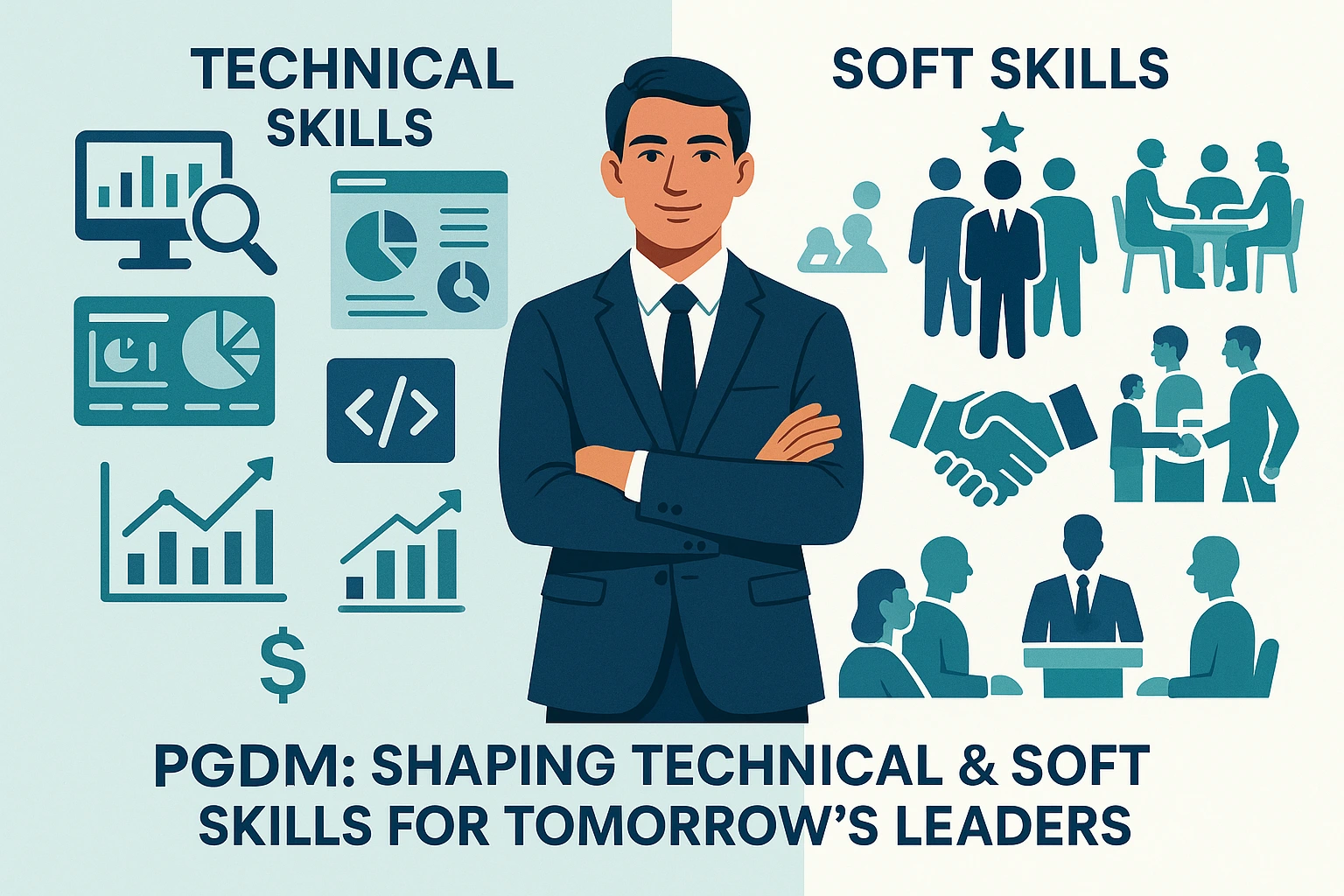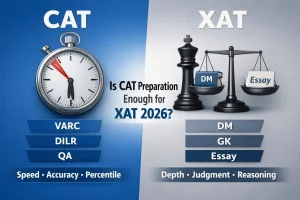Have you ever thought about what it takes to be a good leader in today’s fast-paced corporate world? Is it only your technical skills that matter, or do your communication, leadership, and teamwork skills matter just as much? In a competitive world where professionals need to adapt, come up with new ideas, and lead, having the correct mix of technical and soft abilities is very important.
This is where a PGDM, or Post Graduate Diploma in Management, really shines. This isn’t just another management degree; it’s a life-changing experience that improves your technical skills and teaches you important soft skills like how to communicate, lead, and solve problems. But how can a PGDM help you develop these skills, and why is this combination so useful in the business world? Let’s get started.
How Can a PGDM Program Help Enhance Both Technical and Soft Skills?
1. Technical Skills: Mastering the Core of Business Management
PGDM programs are meant to give students a deep understanding of basic management ideas and the sophisticated technological abilities that are necessary for companies today.
- Financial management: A PGDM program should teach you about corporate finance, budgeting, and financial analysis. These abilities help you make smart choices about money and judge how well a firm is doing.
- Advanced analytical tools: PGDM courses teach students how to use modern analytical tools like Excel, SPSS, Tableau, and Python to understand complicated datasets and make decisions based on data.
- Quantitative techniques: A PGDM teaches you how to do quantitative analysis through classes like statistics, operations research, and econometrics. These tools are very important for things like analysing the market, developing business predictions, and making decisions.
- Technology integration: PGDM programs now include classes in data analytics, digital marketing, and IT management because digital business models are becoming more popular. These lessons teach you how to use technology to help your business expand, making you tech-savvy and flexible.
- Project management: A lot of PGDM courses teach project management, which shows students how to effectively manage budgets, resources, and timeframes. This is very important for making sure that projects in all fields go well.
- Marketing strategies: Students in marketing specialisations learn how to make strategic marketing campaigns, understand how people act as consumers, and use digital & traditional platforms to help their businesses expand.
2. Soft Skills: The Key to Leadership and Teamwork
A competent PGDM program focuses on soft skills which are just as vital as technical skills. These abilities let you talk to people and lead with confidence.
- Negotiation and conflict resolution: You will often have to work out deals or disagreements with your team at work. To help students get better at these skills, PGDM courses often contain simulations of negotiations and exercises in how to deal with conflicts.
- Public speaking and presentations: In the business sector, it’s really important to give presentations that make an impact. PGDM students often have to give presentations on their research, ideas, and projects, which helps them become more comfortable speaking in front of groups.
- Collaboration through group work: Students get to interact with people from different backgrounds on group assignments all the time, which helps them learn how to work together, delegate, and manage a team.
- Emotional intelligence: More and more PGDM programs have workshops or seminars on emotional intelligence. These teach students how to control their emotions, see things from other people’s points of view, and build good connections at work.
- Cultural awareness and adaptability: It’s normal to work with people from different backgrounds in today’s global corporate world. PGDM programs put students in multicultural settings, which helps them become more adaptable and aware of other cultures.
- Time management and multitasking: PGDM students learn how to manage their time well and handle many tasks at once because they have a lot of coursework, group projects, and tight deadlines. These are important abilities that will help students deal with the stresses of running a business in the real world.
Also Read – Top Skills PGDM Students Need to Succeed in 2025 and Beyond
3. Integration of Technical and Soft Skills for Holistic Growth
The best thing about a PGDM is that it combines technical and soft skills into a single learning experience. This all-encompassing method makes sure that students are not just smart but also able to lead teams and solve hard problems.
- Team-based projects: A lot of the work in a PGDM program is meant to be done in groups. This helps students learn how to work with people from different backgrounds and areas of expertise, just like they would in a real business setting.
- Leadership development: In addition to teaching students technical skills, leadership workshops and group activities help them build the confidence and emotional intelligence they need to lead teams and projects well. These leadership skills are very useful for managers.
- Practical problem-solving: Students learn how to use what they learn in class to solve real-world situations by doing case studies and role-playing activities. They can think critically and come up with new ideas since they have both technical abilities and soft skills.
- Cross-functional learning: Students learn how to combine knowledge from several business areas, such as finance, marketing, and operations, by working on projects that need input from all three. This prepares them to think about the whole picture as future managers.
- Decision-making under pressure: Business settings can be unexpected, and managers often have to make judgements quickly. PGDM programs teach students how to think critically about situations, consider their options, and make smart choices while they are under pressure.
- Live industry projects: A lot of business schools partner with companies to give students genuine projects to work on. This lets them use their technical talents while also learning how to manage and operate as a team in a real business context.
Why is it necessary to pursue a PGDM from a leading B-school?
Choosing the right business school can make a big difference in how well-rounded your education is. As one of the best b-schools, Welingkar Institute of Management, offers a curriculum that includes core management courses with specialisations in important areas like Finance, Marketing, Operations, HR, Data Analytics & Digital Technologies, and Innovation & Entrepreneurship.
A PGDM program at WeSchool is not just about learning theory; it’s also about making professionals who are ready for the real world and can do well in business. Here are some ways that Welingkar Institute of Management makes sure that all of its students grow:
Curriculum that is relevant to the industry: The courses are carefully designed to fit the needs of the industry, so students are ready to handle real-world problems.
FAQs
Q1. How does a PGDM program help develop technical skills?
A PGDM program has specialisations in subjects like finance, marketing, and data analytics, and it also gives students hands-on experience through internships and real-world business initiatives.
Q2. What soft skills can I develop through a PGDM program?
Besides Management principles, PGDM programs also teach are how to communicate, lead, work in teams, and solve problems. Activities like case studies, group discussions, and presentations help people get better at these skills.
Q3. Why are soft skills important for a career in management?
In business management, it’s important to have soft skills like communication, leadership, and teamwork in order to manage teams, make strategic decisions, and develop strong relationships with clients.
Q4. What makes Weschool’s PGDM program unique?
Welingkar’s curriculum combines fundamental management courses with speciality tracks and distinctive Essential Skills and Perspectives (ESPs) courses. This way, students graduate with both technical and soft skills.
Q5. How does a PGDM prepare students for the evolving business landscape?
A PGDM gives students the technical and interpersonal abilities they need to react to changes in the market. This makes them well-rounded professionals who are ready to come up with new ideas and lead in their industries.






